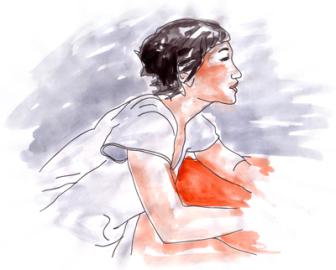Article
Welcome to Chinese poetry - June 2004

January 18, 2006
What strikes me most about Wang’s poetry is its gravity. I recently heard Jeanette Winterson speak passionately about the importance of literature to what she called “the inner life”; this reminds me of Wang Xiaoni’s commitment (expressed very early on in her writing career) to "exposing the complex state of the human psyche with skill and relative accuracy”.
At the same time, she refuses to equate the complexity of the human character with linguistic difficulty, a fact that distinguishes her poetry from many of the most important poets writing in the People’s Republic of China today. This is partly due to the vital role compassion plays in her work: she does not shy away from consolation. Her suite of poems On Visiting Friends, of which six poems have been translated for Poetry International Web, addresses human distress in times of acute suffering and provides a just account: without flinching from the terrible hardships of pain (In your heaven / with the weight of heavy oak gates / the angels too have folded up their wings), she manages to assert a very human hope against hopelessness: In a world quite unworthy of laughter / I finally saw you smile. . . .
Also significant is the distinctness of Wang’s style. As she herself as declared, “it is the inner structure of poetry that is the thing to be sought after: the greatest possible concentration of thought and a striving to obtain the broadest possible content”. She has clearly worked hard for her ideal, because there is genuinely something distinctive about her work. Her choice of words, the development of her poetic “plots” and her idiosyncratic use of punctuation all contribute to this distinctiveness. Best of all, perhaps, are her images and formulations: Sometimes, ten seconds / is longer than a quarter of a century; a sleepless guitarist / steps out dishevelled rhythms / along moonlit streets; In the back of my mind I know / that it is more difficult / to snuff out a woman / than it is to destroy the barnyard grass.
Yu Jian and I hope you can share our enjoyment of Wang Xiaoni’s poetry.
Contemporary mainland Chinese poetry was born on 23 December 1978, the day on which members of the Today! [Jintian] editorial team pasted up copies of their unofficial literature magazine on various walls in Beijing. After ten bloody and chaotic years of "Cultural Revolution", the poetry that emerged in the pages of Today! sought to fuse elements of Chinese tradition with the experiments of Western modernism . . .
Although this month’s poet of the quarter, Wang Xiaoni, was not published in the pages of Today!, she was associated with the “new poetry” of the late 1970s. Probably due to her geographical location in the north-eastern province of Jilin, as well as a strong personal preference for independence, she seemed to remain on the literary margins. I myself had tended to think of her as a minor “obscure” poet, perennially in the shadow of the more celebrated Shu Ting (b. 1952), but when my co-editor Yu Jian recommended Wang Xiaoni’s work to me, I was startled by what I read. It was a timely reminder to me that neither celebrity nor trend-setting are essential to quality poetry . . .What strikes me most about Wang’s poetry is its gravity. I recently heard Jeanette Winterson speak passionately about the importance of literature to what she called “the inner life”; this reminds me of Wang Xiaoni’s commitment (expressed very early on in her writing career) to "exposing the complex state of the human psyche with skill and relative accuracy”.
At the same time, she refuses to equate the complexity of the human character with linguistic difficulty, a fact that distinguishes her poetry from many of the most important poets writing in the People’s Republic of China today. This is partly due to the vital role compassion plays in her work: she does not shy away from consolation. Her suite of poems On Visiting Friends, of which six poems have been translated for Poetry International Web, addresses human distress in times of acute suffering and provides a just account: without flinching from the terrible hardships of pain (In your heaven / with the weight of heavy oak gates / the angels too have folded up their wings), she manages to assert a very human hope against hopelessness: In a world quite unworthy of laughter / I finally saw you smile. . . .
Also significant is the distinctness of Wang’s style. As she herself as declared, “it is the inner structure of poetry that is the thing to be sought after: the greatest possible concentration of thought and a striving to obtain the broadest possible content”. She has clearly worked hard for her ideal, because there is genuinely something distinctive about her work. Her choice of words, the development of her poetic “plots” and her idiosyncratic use of punctuation all contribute to this distinctiveness. Best of all, perhaps, are her images and formulations: Sometimes, ten seconds / is longer than a quarter of a century; a sleepless guitarist / steps out dishevelled rhythms / along moonlit streets; In the back of my mind I know / that it is more difficult / to snuff out a woman / than it is to destroy the barnyard grass.
Yu Jian and I hope you can share our enjoyment of Wang Xiaoni’s poetry.
© Simon Patton and Yu Jian
Sponsors
























